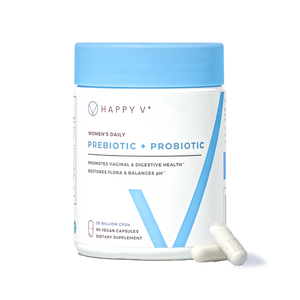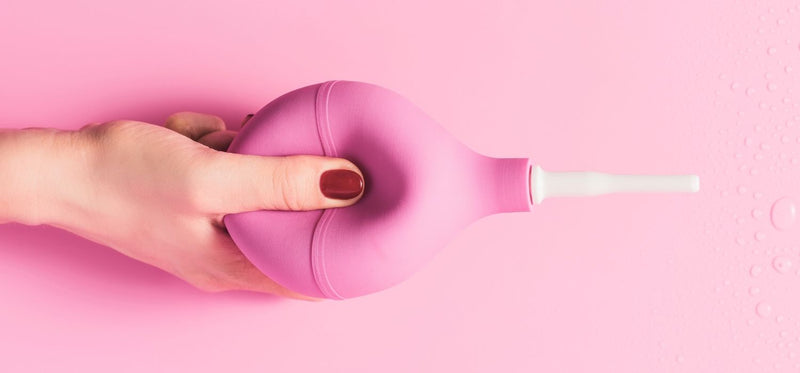
- Fact Checked
- November 20, 2025
- 13 min read
Why Does My Vagina Smell? Understanding Unusual Vaginal Odor (And When to Worry)
Table of Contents
Table of Contents
Catching a whiff of your own self through your pants is uncomfortable at best and downright mortifying at worst, especially if you are out with other people. Can they smell it, too? Do you think you are dirty?
We're here to stop the spiraling and give you everything you need to know about vaginal odors. And the good news is all vaginas smell a certain way, and everyone smells a little bit different. That's because everyone's vaginal flora is a little different, and it's the combination of the microbes within your flora and the sweat glands within the groin region that produce a mild odor.
But what about very strong odors or unpleasant odors that are accompanied by vaginal itching, dryness, or unusual vaginal discharge? These are a sign that something more could be at play. As for what that "something more" is, keep reading.
This post is for informational and educational purposes only and does not constitute medical advice. See full disclaimer below.
What Does a Normal Vagina Smell Like?

Despite what marketing may have you believe, vaginas are not odorless, and they definitely don’t smell like roses. It’s completely normal for a healthy vagina to have a mild, musky odor, especially after a long day of work or traveling. The most common causes of mild vaginal odors include:
- Tight clothes or unbreathable undergarments1
- Excessive sweating
- Overgrowth of otherwise normal vaginal bacteria
- Urinary incontinence, aka urine leakage
- Poor personal hygiene
- Unprotected sexual activity
- Hormonal changes during menstruation, ovulation, pregnancy, or menopause2
- Diet (certain foods can subtly influence body odor)
While this odor is typically a little musky, it can vary throughout your menstrual cycle. For instance, it can be stronger during menstruation or even smell slightly copper-y due to menstrual blood. It can also change odor following sex, as semen’s alkaline pH can temporarily alter the pH of your vagina (and its odor)3. Throughout your cycle, you should also notice your discharge is clear to white, and though it may get thicker around ovulation, it should never be clumpy or have an odor.
Why Does My Vagina Smell Different All of a Sudden?

Though your vagina will seldom be completely odor-free, a new, unusual smell or a strong odor coming from your vagina is definitely something to investigate.
Here are some of the most common causes of unusual vaginal odors and the causes that could be behind them.
1. Sour, tangy, or fermented
A sour or tangy vaginal odor is generally an indication that your vaginal pH balance is off, though it can still be within the normal range.
Essentially, your vaginal pH is determined by healthy bacteria and probiotics from the Lactobacillus species4. These lactobacilli produce hydrogen peroxide and lactic acid, which gives your vagina its slightly acidic pH of between 3.8 and 4.5, which helps keep the growth of bad bacteria in check.
If your vaginal pH levels are more acidic than they should be, though, you will often notice a sour-y or tangy kind of smell.
2. Musky or skunky
You may sometimes notice a musky, skunky, or even earthy smell coming from your vagina that kind of smells like a stronger version of your normal body odor. This is because… it is!
Musky smells are often caused by overperforming apocrine glands (sweat glands) in your groin region. This sweat mixes with the bacteria in and around your vagina, producing a strong, skunky body odor that can sometimes be smelled through your pants.
This type of odor often improves with better ventilation (cotton underwear), regular bathing, and avoiding tight-fitting clothing.
3. Penny-like (metallic smell)
If you ever notice a vaginal odor that is kind of metallic or coppery (kinda like a penny), that is often due to blood that's trapped in your vaginal canal. Typically, you will notice a smell like this during your period or if you are experiencing light spotting after sex. That's because blood contains iron, which is a metal and therefore produces a metallic smell.
You can also experience vaginal odor like this after unprotected sex. Unprotected sex exposes your vagina to semen, which is alkaline in nature, with a pH level between 7.1-8.0. This pH level is much higher than the pH level in your vagina and can cause vaginal pH imbalances.
A metallic smell during your period is normal. If you experience this smell outside of menstruation or sexual activity, or if it's accompanied by unusual bleeding, see a healthcare provider.
4. Bleachy or ammonia-like scent
A bleachy or ammonia-like smell coming from your vagina is often the result of severe dehydration or the presence of urine. Concentrated urine has a stronger ammonia scent that can be noticeable. If you suspect it could be dehydration, drink plenty of water throughout the day. If you suspect it could be urine, try:
- Using the bathroom when you feel the urge to go and not holding it in
- Rinsing your genital area thoroughly after urinating
- Seeking help from a healthcare professional if you believe you are experiencing urinary incontinence or leakage
5. Sweet or yeasty
A sweet-smelling or molasses-y vaginal odor can indicate an imbalance in your vaginal pH5. You'll want to look into ways to restore your vaginal pH ASAP since an imbalanced pH can lead to infection. We'll talk about how to do that in just a bit.
However, if you notice a slightly sweet, yeasty smell accompanied by vaginal itching or thick white discharge, you may have already developed a vaginal yeast infection (also called vaginal thrush)6, in which case, make an appointment with your gynecologist to get started with antifungal treatment or antifungal medication.
6. Rotten or putrid
If you ever notice a strong, rotten, putrid, or straight-up foul-smelling smell coming from your vagina, that's typically caused by something like a forgotten tampon, which is way more common than you might think.
The Food & Drug Administration (FDA) recommends you change your tampon every 4 to 8 hours, but changing more frequently, like every 2-4 hours, can be helpful for those who struggle with vaginal pH imbalance or BV.
Other possible causes of a rotten smell include:
- Severe bacterial infection or anaerobic organisms7
- Rectovaginal fistula (an abnormal connection between the rectum and vagina, which is rare but serious)8
- In very rare cases, gynaecological cancers like cervical cancer or vaginal cancer9
If you've ruled out a forgotten tampon and the smell persists, see your healthcare provider for a vaginal exam and sample of discharge to determine the cause.
Why Does My Vagina Smell Like Dead Fish?

If you are experiencing a strong, fishy smell or fishy odor from your vagina, chances are you are experiencing either bacterial vaginosis (BV)10 or trichomoniasis (trich). Both are incredibly common and treatable, but they have some important differences.
Bacterial Vaginosis (BV)
Bacterial vaginosis is one of the most common vaginal infections out there. According to the Centers for Disease Control and Prevention (CDC), BV affects about 21 million people every year in the US alone. Despite being so common, over 80% (!) of people don't even know they have it because they don't experience any symptoms.
Those who do experience symptoms typically notice:
- An unusual fishy smell
- Increased foul-smelling discharge
- Thin white, gray, or green discharge
- Burning sensation while urinating
- Itching around your vulva region
Trichomoniasis (Trich)
While BV is the most common cause of a fishy vaginal odor, it's not the only one. Trichomoniasis (often called "trich") is a common — but curable11! — STI that can be hard to distinguish from BV at first, though typically the odor is slightly more pungent with trich than BV.
Trichomoniasis is caused by a parasite called Trichomonas vaginalis12, which typically enters the body through genital sexual contact, including oral, vaginal, or anal sex.
Along with a fishy vaginal odor, trich is also associated with symptoms like:
- Foul-smelling, frothy discharge (yellow-green color or green and frothy discharge)13
- Vaginal itching and irritation
- Pain during sex or urination
- Vaginal swelling
Trichomoniasis is treatable with prescription antibiotics, and you can prevent future occurrences with proper contraception, like condoms.
What Happens If I Don't Treat BV or Trichomoniasis?

Leaving a vaginal infection or STI untreated is always bad for your vaginal health. But with BV and trich in particular, leaving them untreated can lead to serious health complications such as:
- Increased risk of preterm births14
- Higher chances of contracting other STIs and urinary tract infections (UTIs)15
- Increased risk of acquiring infections post any kind of surgery in your genital area
- Pelvic inflammatory disease (PID), which can cause chronic pelvic pain and infertility16
- Recurrence of vaginal infections
We know there can be some shame or embarrassment about infections and STIs, but we swear your gynecologist has seen it all, and they will help get you on the path to wellness.
Should I Use a Douche to Clear Vaginal Odor?

No, please don't. Though douches (and any other vaginal cleansers) seem like an easy way to rid yourself of strong odors, they can do more harm than good.
That's because these cleansers, washes, wipes, douches, vaginal deodorants, and feminine sprays often contain chemicals that can disrupt your vaginal pH level, irritate your vagina mucosa, and cause dryness. And though the fragrances are pleasant on your nose, they are rough on your skin and can cause irritation, burning, or itching in or around your vagina.
Why Douching Is Particularly Harmful
Douching—or the practice of rinsing out the inside of your vagina with water or other solutions—is especially problematic because it:
- Strips away the beneficial Lactobacillus bacteria that maintain your vaginal pH and protect against infections17
- Raises your vaginal pH, creating an environment where harmful bacteria thrive18
- Significantly increases your risk of bacterial vaginosis (up to 5 times higher)
- Can push bacteria up into your uterus and fallopian tubes, increasing PID risk
- Makes you more susceptible to STIs and yeast infections
Major health organizations, including the American College of Obstetricians and Gynecologists (ACOG) and the CDC, explicitly recommend against douching due to studies like:
- A 2016 that found that douching in the past 6 months was significantly associated with an increased risk of all types of Human Papillomavirus (HPV) infections.19
- A study on 295 adolescent women showed that STIs within 3 months were associated with the use of feminine sprays and feminine wipes.
How to Safely Eliminate Vaginal Odor

Even though douches and heavily fragranced intimate washes are a no-go, there are many safe, effective ways to reduce and prevent vaginal odor. Remember, every vagina has its own natural scent, so the goal isn’t to erase it completely, but to keep your microbiome balanced and healthy.
Prevention and Hygiene Practices
A few simple hygiene habits can make a big difference in keeping things fresh and balanced:
- Cleanse gently. Wash your vulva (not the vagina) with warm water and a mild, unscented soap. Avoid harsh cleansers or scented products that can throw off your pH.
- Stay fresh before and after sex. Rinse the vulva before and after sexual activity to minimize bacterial transfer.
- Choose breathable fabrics. Switch to cotton underwear to prevent sweat and bacteria from getting trapped.
- Avoid tight or damp clothing. Change out of wet clothes promptly after swimming or workouts. Moisture encourages the growth of odor-causing bacteria.
- Hydrate daily. Drinking plenty of water helps your body flush out toxins and maintain vaginal moisture balance.
- Use barrier protection. Condoms help block bacteria from disrupting your vaginal ecosystem.
- Practice good period hygiene. Change tampons or pads every 2–4 hours and skip scented varieties, which can cause irritation.
- Watch your diet. Cut back on sugary foods and drinks. Excess sugar can feed yeast and throw off your microbiome.
Over-the-Counter Support and Supplements
If you’re looking for a proactive way to reduce vaginal odor and maintain lasting balance, probiotics are one of the most effective tools available20. By supporting the growth of healthy bacteria and crowding out odor-causing species, a daily probiotic helps restore your vaginal microbiome from the inside out.
Probiotics replenish beneficial bacteria that naturally help protect your vaginal environment. When paired with prebiotics—the plant fibers that serve as food for probiotics—these friendly microbes can multiply, thrive, and create a protective barrier that keeps your vaginal pH stable and your flora balanced.
Not all probiotics are created equal, though. Look for clinically proven Lactobacillus strains that are known to support vaginal health and reduce odor, like:
- Lactobacillus acidophilus LA-14® – Helps maintain an optimal vaginal pH and prevents the overgrowth of harmful bacteria.
- Lactobacillus rhamnosus HN001™ – Promotes a healthy microbial balance and supports immune function in the vaginal tract21.
- Lactobacillus crispatus CCFM1110™ – Associated with a healthy vaginal environment and protection against BV recurrence22.
- Lactobacillus reuteri HR7™ – Helps restore balance after antibiotic use and supports long-term vaginal health23.
Also be sure to look at the CFU (colony-forming units) count for each of these strains. A high-quality probiotic should contain at least 1 million CFU per dose of each active strain, ensuring enough live bacteria to make a meaningful difference.
If you want a probiotic that checks every scientific box—and is doctor-formulated specifically for vaginal health—try Happy V’s Prebiotic + Probiotic.
Thousands of women have found that consistent daily use of Happy V helps break the cycle of recurring infections and unwanted odor, supporting not just temporary freshness but true microbiome balance.
When to See a Doctor

Usually, mild odors aren't anything to worry about health-wise. If the odors are strong and/or accompanied by symptoms like vaginal itching, unusual discharge, pain urinating, pelvic pain, or vaginal swelling, you should seek the advice of a healthcare provider. These symptoms often indicate a vaginal infection like BV, vaginitis, or vaginal yeast infection.
Your doctor will conduct a vaginal exam, review your medical history, and may take a sample of discharge to identify the specific problem. Based on the diagnosis, they'll recommend appropriate treatment, whether that's prescribed medications like antibiotics for bacterial vaginosis, antifungal medication for yeast infections, or other home remedies and interventions. Your doctor will help make an accurate diagnosis and get you on a treatment plan.
Final Thoughts
Vaginal odor is a normal part of having a vagina. A mild, musky scent that varies throughout your cycle is nothing to worry about. It's simply your body doing what it's designed to do.
However, strong, fishy, or foul-smelling odors accompanied by discharge, itching, or discomfort signal that something needs attention. Whether it's bacterial vaginosis, a yeast infection, or another treatable condition, don't ignore these symptoms or try to mask them with douches or scented products.
Instead, practice simple, gentle hygiene, support your vaginal microbiome with targeted probiotics, and see a healthcare provider for any symptoms. You deserve to feel confident and comfortable in your body. With the right knowledge and support, you can eliminate unusual vaginal odors.
Keep the Conversation Going
-
Visit our blog for more women's health tips.
- Join our private Happy V Facebook group to hear from others who've been there.
- Explore supplements designed to support your vaginal health journey.
Disclaimer: This blog is for informational and educational purposes only and is not intended to diagnose, treat, cure, or prevent any disease. Statements about supplements have not been evaluated by the Food and Drug Administration. For more information about vaginal infections, visit the CDC or speak to a licensed healthcare provider.














